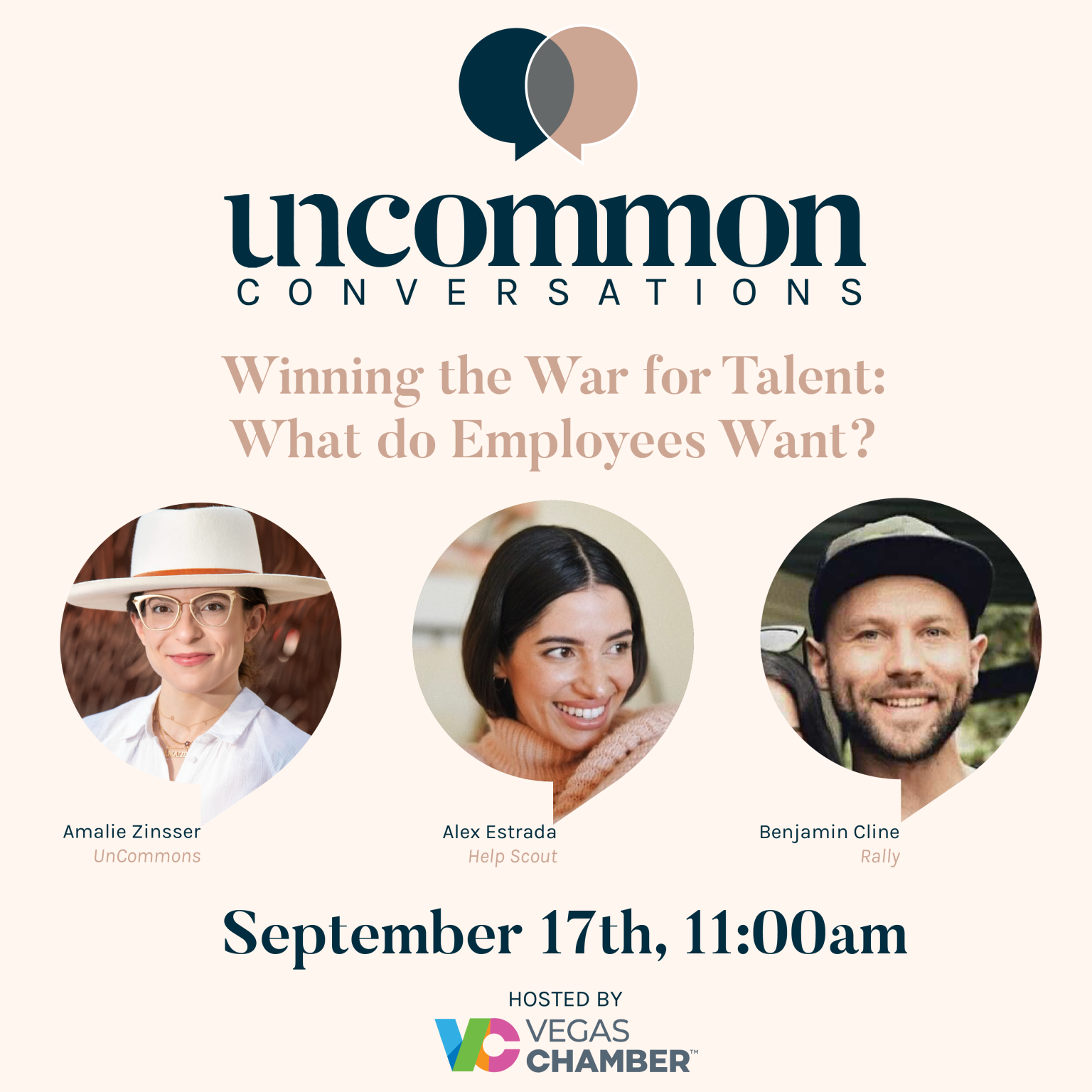Trust, Transparency and Culture are Silver Bullets to Winning the War for Talent

On Friday, Sept. 17, we hosted our second “Uncommon Conversations” panel discussion in conjunction with the Las Vegas Chamber. In light of today’s competitive environment for attracting employees, we focused the discussion on “Winning the War for Talent: What Do Employees Want.” Led by UnCommons Community Director Amalie Zinsser, the thoughtful conversation shared insights from wife-husband power household Alex Estrada, product designer at global remote software company, Help Scout, and Benjamin Cline, design director and co-founder of product studio, Rally Interactive.
Many leaders feel like talent is leaving in alarming rates and the numbers support the perception. According to Harvard Business Review, in July of this year, four million Americans quit their job, with the top fields for resignation being tech and medical, leaving 10.9 million open positions. With what some have termed “The Great Resignation,” Alex and Benjamin shared what they believe will help companies retain their employees.
Benjamin reminded business owners that perhaps their business is their baby but for their employees, it’s still a job. No matter how engaged an employee is in their work, they will still have other priorities. Alex and Benjamin agreed that the most important pieces for employers to work on for the sake of their employees is trust, transparency and culture that makes each individual feel valued.
Every person is made up of different fabric and has different priorities; therefore, each employee has a different way of working that is best for them individually. Employers are best served to set up an environment where each person has what they need to do their job then set them loose. UnCommons helps to support this with trails dotted with local art that will be a welcoming setting for walking meetings. Employers must learn who their employees are, how they work and what their priorities are. Employers must trust their teams to do their work and emphasize output instead of input.
With teams moving day by day from virtual to in-person to hybrid working models and back again, it’s important that leaders are transparent. Benjamin told a personal story about being transparent last year when revenue in his company hit a brick wall and his team was feeling uneasy. He also shared tangible ways to increase transparency:
- Expectations for advancement must be made clear so anyone at any level can set their sights on the next step and work towards it, should they choose
- Increase frequencies of one-one-ones
- Establish office hours
Trust, transparency and many other important parts of winning the war on talent can all be explained by culture. Everyone talks about it but it’s not easy to create. The duo emphasized that it’s okay for employers to stumble when working to enhance the company’s culture because it shows that they are working towards change. Employees should also feel empowered to influence the company culture that are part of instead of being dictated to. Some think that virtual work is a roadblock to culture, but Alex insists that’s not true. If an office is set up for virtual working, it’s much easier to transition to in-person and hybrid. Additionally, if a company is set up for virtual work, team members never feel that they’re missing out, whether working remotely or because they had to miss a meeting for an unexpected appointment. Some simple tips Alex shared to set up a workforce for virtual work and enhance that culture:
- Include a Zoom link in every meeting regardless of if you anticipate anyone using it
- If every meeting is recorded and posted, then those who missed a meeting OR new team members can efficiently catch up
- Document work, whether written or on video with a tool like Loom, takes time but is worth it so everyone can be involved and easily jump in where needed
- Create virtual times where two people are randomly matched that mimic watercooler talks or passing in the hallway where team members who aren’t working on the same projects have 15-minute virtual chats
Underlying all these suggestions is that employers will best succeed if they treat their team as individuals and understand that each has different priorities and work styles. Fitting a triangle employee into a square role makes the employee feel undervalued and isn’t necessary with a little bit of thought, a lot of communication and some technological assistance.
Uncommon Conversations is a free-to-attend recurring panel discussion that encourages ambiguous, vulnerable and open dialogue celebrating differences and cultivating a shared human connection. If you missed the conversation and want to watch, see the full recording here and be sure to stay tuned our social channels for our next Uncommon Conversation.


